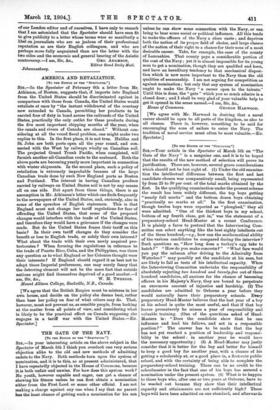THE GATE OF THE NAVY.
[To THE EDITOR Or THE " SPECTATOR."] Sra,—In your interesting article on the above subject in the Spectator of March 5th I think you overlook one very serious objection alike to the old and new methods of admitting cadets to the Navy. Both methods turn upon the system of nomination, and it is to this, as at present administered, that I have repeatedly objected in the House of Commons, because it is both unfair and unwise. For how does this system work ? No youth, however capable and eager, can get a chance of showing his fitness unless he can first obtain a nomination either from the First Lord or some other official. I am not making a charge against any one when I say that no parent has the least chance of getting such a nomination for his son
unless he can show some connection with the Navy, or can bring to bear some social or political influence. All this tends to make the officers of the Navy a close caste ; and deprives both the nation of its proper field of choice, and large classes of the nation of their right to a chance for their sons of a most desirable career. Take, for example, the case of the county of Lancashire. That county pays a considerable portion of the cost of the Navy ; yet it is almost impossible for its young men to get a nomination, though they are qualified and keen, and have an hereditary tendency to that mechanical disposi- tion which is now more important to the Navy than the old qualities of seamanship. I am not arguing for competition as against nomination ; but only that any system of nomination ought to make the Navy "a career open to the talents." Until this is done, the " gate " which you so much admire is a closed door ; and I shall be very glad of your valuable help to get it opened in the sense named.—I am, Sir, &c.,
House of Commons. GEORGE HARWOOD.
[We agree with Mr. Harwood in desiring that a naval career should be open to all parts of the kingdom, as also to all classes. There is, however, something to be said for encouraging the sons of sailors to enter the Navy. The tradition of naval service must often be most valuable.—En. Spectator.]










































 Previous page
Previous page